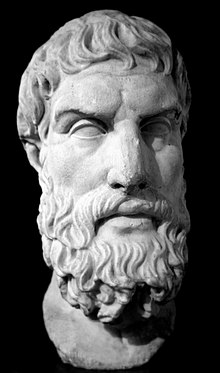Epicurus
ancient Greek philosopher From Wikipedia, the free encyclopedia
ancient Greek philosopher From Wikipedia, the free encyclopedia
Epicurus[2] (Samos, 341 BC – Athens, 270 BC) was an ancient Greek philosopher. He started a school of philosophy called Epicureanism.
Epicurus | |
|---|---|
 Roman marble bust of Epicurus | |
| Born | February 341 BC |
| Died | 270 BC |
| Era | Ancient philosophy |
| Region | Western philosophy |
| School | Epicureanism, atomism, materialism, hedonism |
Main interests | Physics, ethics, epistemology |
Notable ideas | Pleasure principle, the "moving"/"static" pleasures distinction, ataraxia, aponia, atomic swerve[1] |
Influences
| |
Influenced
| |
As a boy he studied philosophy under the Platonist teacher Pamphilus for about four years. At the age of 18 he went to Athens for his two-year term of military service. Epicurus never married and had no children, so far as we know.
Epicurus helped in the development of science and the scientific method because he said that nothing should be believed except what we can test through direct observation and logical deduction. His ideas about nature and physics hinted at scientific concepts developed in modern times.
Epicurus' only surviving complete works are three letters, which can be found in book X of Diogenes Laertius' Lives of Eminent Philosophers, and two groups of quotes: the Principal Doctrines, reported as well in Diogenes' book X, and the Vatican Sayings, preserved in a manuscript from the Vatican Library.
Many pieces of his thirty-seven volume treatise On Nature have been found in the burnt papyrus fragments at the Villa of the Papyri at Herculaneum.
Seamless Wikipedia browsing. On steroids.
Every time you click a link to Wikipedia, Wiktionary or Wikiquote in your browser's search results, it will show the modern Wikiwand interface.
Wikiwand extension is a five stars, simple, with minimum permission required to keep your browsing private, safe and transparent.